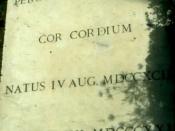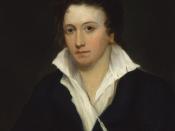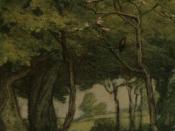ESSAY TOPIC:Analyse the following statement from Shelley's A Defense of Poetry using Wimsatt and Beardley's article "The Intentional Fallacy". Your essay must contextualise the quote, demonstrate the quote's relationship to the broader theory of Romantic authorship, and provide a definition of intention and why it is central to the Romantic conception of authorship.
"A man cannot say, 'I will compose poetry.' The greatest poet even cannot say it; for themind in creation is as a fading coal, which some invisible influence, like an inconstantwind, awakens to transitory brightness; this power arises from within, like the colour of aflower which fades and changes as it is developed, and the conscious portions of ournatures are unprophetic either of its approach or its departure." (503-04)- Percy Bysshe Shelley, A Defence of PoetryESSAY"This power arises from within". The power of creativity, of intellect, of imagination,comes from within Man himself. This in essence is the main argument of Percy ByssheShelley's essay A Defence of Poetry, written in response to Thomas Love Peacock'sessay Four Ages of Poetry, in which Peacock writes about the redundancy of poetry.
What prompted Shelley's discourse? It could well have been this inflammatory line fromPeacock's (2006) essay: "A poet in our times is a semi-barbarian in a civilizedcommunity. He lives in the days that are past. His ideas, thoughts, feelings, associations,are all with barbarous manners, obsolete customs, and exploded superstitions. The marchof his intellect is like that of a crab, backward." Or even worse, this line: "⦠it does notfollow that a writer of poetry in the present state of society is not a waster of his owntime, and a robber of that of others".
A waste of time? A robbery of the same? Surely Shelley, himself a writer and poet, musthave taken great offence to the words of...


